Exam 8: Alkyl Halides and Elimination Reactions
Exam 1: Structure and Bonding77 Questions
Exam 2: Acids and Bases59 Questions
Exam 3: Introduction to Organic Molecules and Functional Groups56 Questions
Exam 4: Alkanes64 Questions
Exam 5: Stereochemistry76 Questions
Exam 6: Understanding Organic Reactions53 Questions
Exam 7: Alkyl Halides and Nucleophilic Substitution73 Questions
Exam 8: Alkyl Halides and Elimination Reactions52 Questions
Exam 9: Alcohols,ethers,and Related Compounds60 Questions
Exam 10: Alkenes and Addition Reactions54 Questions
Exam 11: Alkynes and Synthesis51 Questions
Exam 12: Oxidation and Reduction51 Questions
Exam 13: Radical Reactions51 Questions
Exam 14: Conjugation, resonance, and Dienes53 Questions
Exam 15: Benzene and Aromatic Compounds47 Questions
Exam 16: Reactions of Aromatic Compounds60 Questions
Exam 17: Introduction to Carbonyl Chemistry; Organometallic Reagents; Oxidation and Reduction59 Questions
Exam 18: Aldehydes and Ketones - Nucleophilic Addition52 Questions
Exam 19: Carboxylic Acids and the Acidity of the O-H Bond53 Questions
Exam 20: Carboxylic Acids and Their Derivatives - Nucleophilic Acyl Substitution50 Questions
Exam 21: Substitution Reactions of Carbonyl Compounds at the a Carbon47 Questions
Exam 22: Carbonyl Condensation Reactions51 Questions
Exam 23: Amines65 Questions
Exam 24: Carbon-Carbon Bond-Forming Reactions in Organic Synthesis47 Questions
Exam 25: Pericyclic Reactions62 Questions
Exam 26: Carbohydrates50 Questions
Exam 27: Amino Acids and Proteins46 Questions
Exam 28: Synthetic Polymers45 Questions
Exam 29: Lipids45 Questions
Exam 30: Molecular Ion Peaks and Fragmentation Patterns19 Questions
Exam 31: Analyzing Molecular Motion and Infrared Spectroscopy37 Questions
Exam 32: Organic Spectroscopy Concepts51 Questions
Select questions type
Which of the following is the major elimination product of the following reaction? 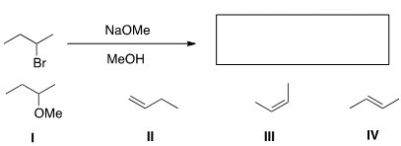
Free
(Multiple Choice)
4.8/5  (34)
(34)
Correct Answer:
D
Which is the most likely mechanism for the following reaction? 
Free
(Multiple Choice)
4.9/5  (32)
(32)
Correct Answer:
D
Which of the following is the least reactive substrate in an E2 reaction? 
Free
(Multiple Choice)
4.7/5  (38)
(38)
Correct Answer:
A
What is the major elimination product obtained from the following reaction? 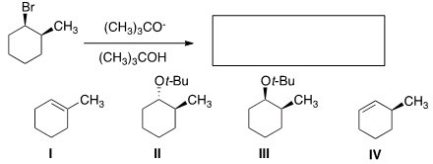
(Multiple Choice)
4.8/5  (38)
(38)
What is (are)the elimination product(s)of the following reaction? 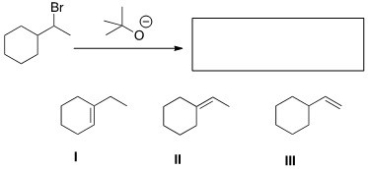
(Multiple Choice)
5.0/5  (29)
(29)
Which of the labeled protons in the compound below is most readily abstracted under E2 conditions? 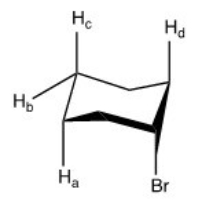
(Multiple Choice)
4.7/5  (35)
(35)
What is (are)the elimination product(s)of the following reaction? 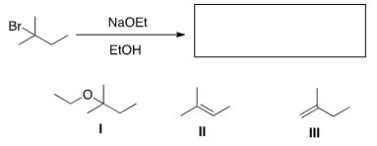
(Multiple Choice)
4.9/5  (32)
(32)
Which of the following statements about an E1 mechanism is not true?
(Multiple Choice)
4.8/5  (42)
(42)
Which of the following is the most reactive substrate in an E1 reaction? 
(Multiple Choice)
4.8/5  (36)
(36)
What is the major elimination product obtained from the following reaction? 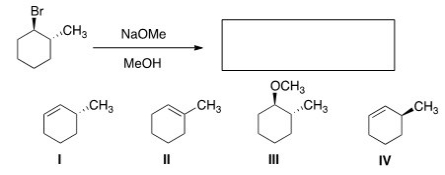
(Multiple Choice)
4.8/5  (41)
(41)
What is the major elimination product in the reaction of 1-bromobutane with potassium tert-butoxide in tert-butanol?
(Multiple Choice)
4.9/5  (42)
(42)
Which of the following statements about the mechanism of an E2 reaction is true?
(Multiple Choice)
4.7/5  (31)
(31)
Which alkyl halide(s)would give the following alkene as the only product in an elimination reaction? 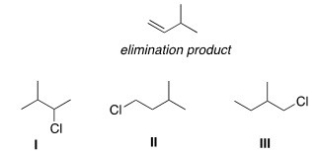
(Multiple Choice)
4.8/5  (37)
(37)
Which of the following alkyl halides would afford the indicated product upon reaction with sodium methoxide? 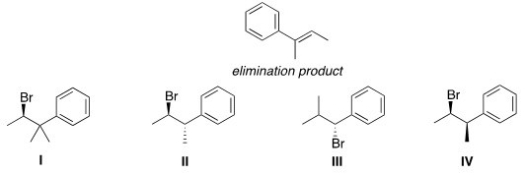
(Multiple Choice)
4.9/5  (39)
(39)
Showing 1 - 20 of 52
Filters
- Essay(0)
- Multiple Choice(0)
- Short Answer(0)
- True False(0)
- Matching(0)